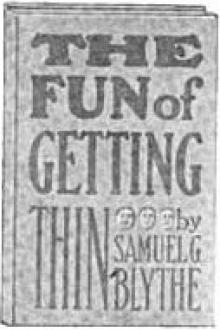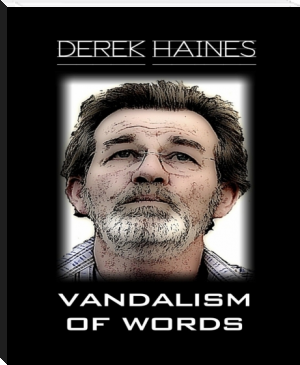The Fun of Getting Thin, Samuel G. Blythe [new ebook reader .txt] 📗

- Author: Samuel G. Blythe
- Performer: -
Book online «The Fun of Getting Thin, Samuel G. Blythe [new ebook reader .txt] 📗». Author Samuel G. Blythe
I was not an amateur at the game. I had been through the mill. I spent several days in going over the whole matter. It was reasonably simple, too, and needn't have taken so much of my time; but I was protecting myself, you see, gold-bricking myself—trying to find a way out that would not deprive me of things I liked to do, of pleasures I wanted to enjoy. It was pure selfishness that dominated me and made me do so much figuring on a proposition I knew was contained in a sentence; but I did fight to hang on to the old way of living.
After each session of false logic and selfish hypothesis I invariably came back to the same proposition, which is the only proposition—and that was: What makes fat? Food and drink. How can you reduce fat? By reducing the amount of food and drink—that is all there is or was to it. The only way to get rid of the effects of overeating and overdrinking is to stop overeating and overdrinking.
I went over my food habit. I was accustomed to eating a big hired-man's breakfast—fruit, coffee, eggs, waffles, hot bread, sausage, anything that came along; and I heaved in a lot of it—not a little—a lot! I didn't eat so much at luncheon, but I ate plenty; and at night I simply cleaned up the table. I wasn't so strong on sweets and pastry, because I usually drank a few highballs during the day, and highballs and cocktails and sweets do not go well together—that is, the man who takes alcohol into his system usually does not care for sweets. Beer was one of my long suits too—Pilsner beer. I did like that!
I looked this food habit squarely in the face. I impaled the drink habit with my glittering eye. I knew I was eating about sixty per cent more than I needed or could use, and that I was drinking a hundred per cent more. I knew that nothing makes fat but food and drink. I knew excess of food will make any animal fat and I saw I had been eating freely of the most fattening kinds of food. I knew beer and liquor were made of grain, and that grain is used to fatten steers and cows and pigs. I refused to adopt a diet like any of those unpalatable ones I had experimented with, but the remedy was as plain as the cause. It was simple enough if I had the nerve to go through with it.
Inasmuch as an excess of food and drink make an excess of fat, it follows that the reduction in the amount of food will stop that fat-forming and give the body a chance to burn up the excess fat already formed. That was my conclusion. Mind you, I reached that conclusion before I made any of my arguments; but I didn't want to admit it as reasonable or logical, for I hated to give up the pleasures of the table and the sociability that came with the sort of drinking I did. I was trying to find a way out that would be easy and comfortable. And all the time I was getting fatter! The scales told me that.
This backing and filling and argument with myself lasted all through January and part of February. It took me six weeks to get myself into the frame of mind where I admitted the truth of my conclusion. I was no hero. I didn't want to do it. I loved it all too well. I was as rank a coward in the beginning as you ever saw! It appalled me to think of restricting myself in any way, for I liked the pleasures that I knew I must forego. However, when I got up to two hundred and fifty pounds I sat down and had it out with myself.
"Here!" I said to myself. "You big stuff, you now weigh two hundred and fifty pounds! In another year or two you will weigh two hundred and seventy-five pounds! You are uncomfortable and heavy on your feet, and you are gouty and wheezy; and it's a cinch you'll die in a few years if you keep on this way. You know all this fat is caused by an excess of food and drink, and you know it can be taken off by a reduction in those fatmakers. Are you going to stick round here so fat you are a joke, uncomfortable, miserable when it's hot, in your own way and in the way of everybody else, when, if you've got the will-power of a chickadee, you can get back to reasonable proportions and comfort merely by denying yourself things you do not need?"
All the old arguments obtruded. See what I should lose! Life would be a dull and dreary affair—a dun, dismal proposition. I admitted that. On the other hand, however, life would not be a wheezy, sweaty, choked-heart, uncomfortable proposition. I finally decided I would go to it. And I did.
My method may be utterly unscientific. I suppose it hasn't a scientific leg to stand on. Still, it did the business. And I maintain that results are what we are looking for. The end justifies the means. I didn't figure out a diet. I had a dozen of them at home that had cost me all the way from two dollars to two hundred and fifty dollars each. I didn't buy a system of exercise. I read no books and consulted no doctors. What I did was this: I cut down the amount of food I ate sixty per cent and I cut out alcohol altogether! I carried out my argument to its logical conclusion so far as it concerned myself. I didn't give a hoot whether it would help or hurt or concern any other person in the world. It was my body I was experimenting on, and I did what I dad-blamed pleased and asked no advice—nor took any.
Instead of a hot-bread—I have the greatest hot-bread artist in the world at my house, bar none!—waffle, sausage, kidney-stew, lamb-chop, fried-egg and so forth sort of breakfast, I cut that meal down to some fruit, a couple of pieces of dry, hard toast, two boiled eggs and coffee. I cut out the luncheon altogether. No more luncheon for me! I cut down my dinners to about forty per cent of what I had been eating. I diminished the quantity, but not the variety. I ate everything that came along, but I didn't eat so much or half so much. Instead of two slices of roast beef, for example, I ate only one small slice. Instead of two baked or browned potatoes, I ate only half of one. Instead of three or four slices of bread, I ate only one. I didn't deprive myself of a single thing I liked, but I cut the quantity away down. And I quit drinking alcohol absolutely.
What happened? This is what happened: Eating food is just as much a habit as breathing or any other physical function. I had got myself into the habit of eating large quantities of food. Also, I had accustomed my system to certain amounts of alcohol. I was organized on that basis—fatly and flabbily organized, to be sure, but organized just the same. Now, then, when I arbitrarily cut down the amount of food and drink for which my system was organized that entire system rose up in active revolt and yelled for what it had been accustomed to get. There wasn't a minute for more than three months when I wasn't hungry, actually hungry for food; when the sight of food did not excite me and when I did not have a physical longing and appetite for food; when my stomach did not seem to demand it and my palate howl for it. It was different with the drinking. I got over that desire rather promptly, but with a struggle, at that; but the food-yearn was there for weeks and weeks, and it was a fight—a bitter, bitter fight!
When I went to the table and saw the good things on it, and knew I intended only to eat small portions of them, especially of my favorite desserts and my beloved hot-bread, I simply had to grip the sides of my chair and use all the will-power I had to keep from reaching out and grabbing something and stuffing it into my mouth! My friends used to think it was all a joke. It was farther from being a joke than anything you ever heard about. It was a tragedy—a grim, relentless tragedy! It was acute physical suffering. My body cried out for that same amount of food I had been giving it all those years. I wanted to give it that same amount. I have had to leave the table time and time again to get hold of myself and go back to the smaller portions I had allotted to myself. I liked to eat, you know.
Nothing much happened for a few weeks, though the waistband of my trousers grew looser. Then a lot of excess baggage seemed to drop away all at once. I weighed myself and found I had taken off twenty-five pounds. Friends told me to quit—that I should overdo it. I laughed at them. I knew I was still twenty-five pounds too heavy and I was just getting into my stride. It is strange how men, and especially fat men, who haven't the nerve to reduce themselves, think a man must be sick if he takes off flesh. I knew I wasn't sick. Indeed, I was just beginning to get well.
By the end of three months I had taken off thirty-five pounds. It was coming off well, too. My face wasn't haggard or wrinkled. I looked fit. My eye was clear and my double chin had disappeared. Also, I had conquered my fight with my appetite. I had won out. I was satisfied with the smaller quantities of food and I felt better than I had in twenty years—stronger, fitter—and was better, mentally and physically. After that it was a cinch. I kept along, eating everything on the bill-of-fare, but in small quantities. I didn't vary my diet a bit, except for the eggs at breakfast. If I wanted pie I ate a small piece. If I wanted ice cream I ate a small dish. If I wanted pudding I ate some of that. I ate fat meat and lean meat and spaghetti, and everything else interdicted by the reduction dietists—only in small quantities! And I kept on getting smaller and smaller.
The fat came off from everywhere. I had been incased with it apparently. My waist decreased seven inches. A big layer of fat came off my chest and abdomen. My legs and arms grew smaller but harder. Even my fingers grew smaller. My excess of chin evaporated. And at the end of the fifth month I had taken off fifty-five pounds. I weighed then one hundred and ninety-five pounds, which is what I weigh today.
Every person, I take it, has a normal weight; and if that person gives his body a chance, and ill health does not intervene, the body will find that normal and stay there. I take it that my normal weight, on account of my big frame and bones, is about one hundred and ninety-five pounds, at the age of forty-three. At any rate, it has stayed at a hundred and ninety-five since the first of last July, and in that time I have loafed for two months and ridden on Pullman cars for two other months, and have not taken any exercise to speak of; but I have maintained my schedule of eating and I have not taken any alcohol. I figure I can stay where I am indefinitely





Comments (0)